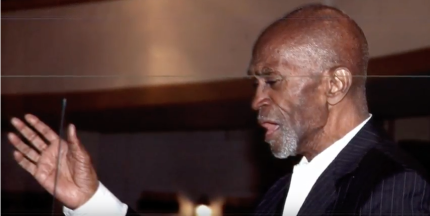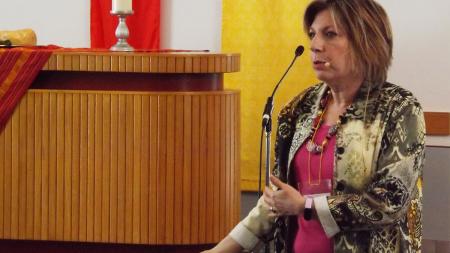Ordination Comes after Decades of Helping Alcoholics and Drug Addicts

James Allen
Video for My Bad, My Good
For nearly 60 years, James Allen has been crusading in Harlem, New York, on behalf of alcoholics and drug addicts, fighting on their behalf and helping them to get clean and sober so they can start to build better lives.
But during that time he was never ordained to the ministry.
For a period of time, he was a lay minister for what was then Christian Reformed Home Missions. A former heroin addict himself, Allen traveled to churches and told his story, which included how Manhattan Christian Reformed Church in Harlem, which he attended, had called him to work with addicts and how he started the Addicts Rehabilitation Center (ARC) in the church building.
When Manhattan CRC in Harlem closed in the early 1990s, Allen stayed and helped another church — the nondenominational Christian Family Renewal Center — purchase the building, started going to that church, and continued his lay ministry.
Through the years, several churches have offered to ordain the now 92-year-old ministry leader, which would have given him the credentials to baptize, marry, and bury people and to conduct the Lord’s Supper.
But Allen always declined — that is, until the morning of Sunday, Feb. 25, when the Christian Family Renewal Center ordained him as a minister.
“Somehow the way it went,” said Allen, “was that I never felt worthy to be ordained. But I always do what God tells me to do” — and recently he felt that God had finally opened the door for him to be ordained.
Rev. Ronald Sullivan, pastor of the nondenominational congregation, wrote a letter in early February to church members and others explaining the intention to ordain Allen.
Describing how Allen, through his leadership of the ARC, has helped many people break free of their addictions, Sullivan writes that Allen’s life “has been a powerful testimony to what God can do when we allow him to use us to minister to others.”
Held as part of their Black History month activities, the service was very powerful, said Carolyn Ingram, who was also a member when the church was a CRC congregation and, having been at the church through the years, is now the church secretary.
During the service, she said, Sullivan asked Allen some doctrinal questions — which he answered — offered prayers, handed him a certificate attesting to his ordination, and gave him a pastoral robe as a sign and symbol of his new office.
Then several choirs, including the ARC Choir that Allen began, surrounded the new minister and sang “Our God Is an Awesome God,” filling the sanctuary with dozens of glad voices.
“The church really turned out for this,” Ingram said. “This is his church. He has shaped us in so many ways. He never went anywhere else, and he has always been at the center of things. I’m so proud that God allowed us to do this for him.”
With a smile on his face, Allen said little but was clearly moved, she said.
“Mr. Allen is a humble man who has remained true in keeping God’s name with honor and praise,” said Ingram, a Calvin College graduate who once traveled with the ARC Choir when it performed before CRC congregations in the Midwest.
Now that he is a reverend, Allen said he likely won’t change his work. He is retired from the ARC, which operates four facilities in Harlem for addicts, persons with AIDs and the homeless.
But, he said, he still stays busy, among other things conducting a Sunday morning ARC gathering called “Bible Fantasy.”
“We have people who come into the ARC program, and I introduce them to spiritual things and hope they want to get a better idea of God,” said Allen. “We don’t push people, and we don’t argue.”
Born in Texas, Allen spent much of his childhood with his grandparents on a farm in Louisiana. When he came to live in New York, he became a drug addict. Along with many others, he shot up heroin in littered alleys and spent his days sitting along streets, nodding off.
During a sober period, he met and married his wife, Mary, in 1955. But then he went back to drugs. In 1957, after finally getting clean with God’s help, he and his wife attended the Manhattan CRC one morning.
Sitting there, Allen said, he listened attentively as the pastor, Eugene Callender, said he believed that God had been calling him “to love dope fiends.”
Upon hearing that, said Allen, “I was hooked.”
The next day he and Callender began a meeting for addicts, and that was the start of the ARC.
“Everyone ignored junkies at the time. No one was out there to help them,” said Allen.
Besides the work with addicts, Allen eventually started and led the ARC Choir, made up of recovering addicts, who have recorded several albums and have traveled the world to perform and tell the ARC story.
Before and after Allen’s ordination, friends and pastors wrote letters celebrating and offering praise for him and his pioneering work in New York City, helping more than 20,000 addicts as well as persons with AIDs over the years.
“James Allen's musical acumen contributed greatly in attracting African Americans to Manhattan CRC in the 1960s,” said Rev. Reggie Smith, director of the CRC’s Office of Race Relations and Office of Social Justice.
“In addition, his own struggle with drug addiction made Allen the perfect person to start one of the first full-scale rehab facilities in New York.”
In a tribute to Allen, Rev. James White, a former pastor at Manhattan CRC, wrote: “When Harlem was drowning in drugs, James Allen brought profound healing that enabled us to rebuild our community.”
Rev. Karel Boersma, who served Manhattan CRC from 1979 to 1983, wrote that the church in Harlem and James Allen were legendary as the forerunners of urban ministry in the CRC.
Growing up in West Michigan, Boersma said, he had never dreamed he would one day be a pastor there.
“To say that Mr. Allen was a man with a passion is an understatement. Once he found his mission, he dedicated himself, body and soul, to the mission of recovery and would let nothing deter him from his mission to people suffering addiction to drugs.”
Boer recalled how Allen began the ARC Choir to help pay the mortgage for a new home for ARC on Park Avenue.
“He is a master not only at solving problems with addiction, but also overcoming obstacles that might have overcome lesser gifted people,” wrote Deboer.
Rev. Duane Vanderbrug, who served at Manhattan CRC from 1960 to 1962, wrote a letter to Allen. In it he says that Allen’s courageous acts of love, mercy, justice, and redeeming grace representing Jesus remind him of the disciple Peter, who was called before the Sanhedrin to account for the power or name by which he and the disciple John had healed a man. “It is by the name of Jesus Christ,” Peter answered (Acts 4:10).
So, Vanderbrug wrote to Allen, “your ‘being with Jesus’ has shown in the many ways God has used you to heal those crippled with addictions. Now as an ordained agent of Jesus, may your being Jesus’ representative shine even more brightly until the day Christ returns.”
Watch a video that offers a look on Allen’s life based on his autobiography My Bad, My Good. which is available by contacti
Contact Jame Allen through this twitter account.


